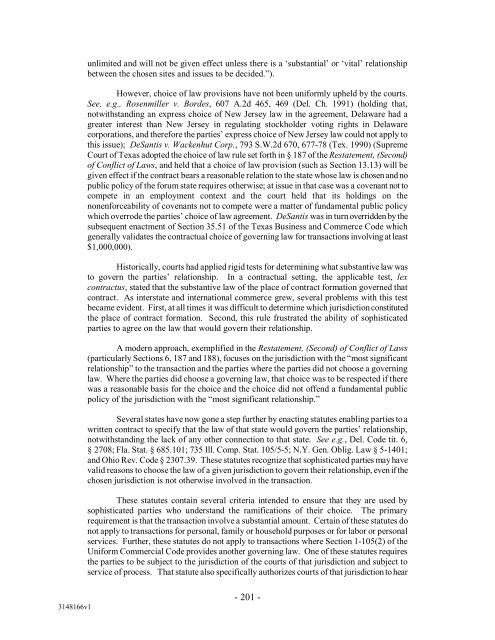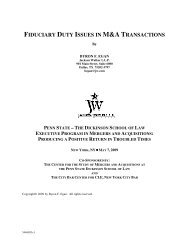asset acquisitions - Jackson Walker LLP
asset acquisitions - Jackson Walker LLP
asset acquisitions - Jackson Walker LLP
You also want an ePaper? Increase the reach of your titles
YUMPU automatically turns print PDFs into web optimized ePapers that Google loves.
unlimited and will not be given effect unless there is a ‘substantial’ or ‘vital’ relationshipbetween the chosen sites and issues to be decided.”).However, choice of law provisions have not been uniformly upheld by the courts.See, e.g., Rosenmiller v. Bordes, 607 A.2d 465, 469 (Del. Ch. 1991) (holding that,notwithstanding an express choice of New Jersey law in the agreement, Delaware had agreater interest than New Jersey in regulating stockholder voting rights in Delawarecorporations, and therefore the parties’ express choice of New Jersey law could not apply tothis issue); DeSantis v. Wackenhut Corp., 793 S.W.2d 670, 677-78 (Tex. 1990) (SupremeCourt of Texas adopted the choice of law rule set forth in § 187 of the Restatement, (Second)of Conflict of Laws, and held that a choice of law provision (such as Section 13.13) will begiven effect if the contract bears a reasonable relation to the state whose law is chosen and nopublic policy of the forum state requires otherwise; at issue in that case was a covenant not tocompete in an employment context and the court held that its holdings on thenonenforceability of covenants not to compete were a matter of fundamental public policywhich overrode the parties’ choice of law agreement. DeSantis was in turn overridden by thesubsequent enactment of Section 35.51 of the Texas Business and Commerce Code whichgenerally validates the contractual choice of governing law for transactions involving at least$1,000,000).Historically, courts had applied rigid tests for determining what substantive law wasto govern the parties’ relationship. In a contractual setting, the applicable test, lexcontractus, stated that the substantive law of the place of contract formation governed thatcontract. As interstate and international commerce grew, several problems with this testbecame evident. First, at all times it was difficult to determine which jurisdiction constitutedthe place of contract formation. Second, this rule frustrated the ability of sophisticatedparties to agree on the law that would govern their relationship.A modern approach, exemplified in the Restatement, (Second) of Conflict of Laws(particularly Sections 6, 187 and 188), focuses on the jurisdiction with the “most significantrelationship” to the transaction and the parties where the parties did not choose a governinglaw. Where the parties did choose a governing law, that choice was to be respected if therewas a reasonable basis for the choice and the choice did not offend a fundamental publicpolicy of the jurisdiction with the “most significant relationship.”Several states have now gone a step further by enacting statutes enabling parties to awritten contract to specify that the law of that state would govern the parties’ relationship,notwithstanding the lack of any other connection to that state. See e.g., Del. Code tit. 6,§ 2708; Fla. Stat. § 685.101; 735 Ill. Comp. Stat. 105/5-5; N.Y. Gen. Oblig. Law § 5-1401;and Ohio Rev. Code § 2307.39. These statutes recognize that sophisticated parties may havevalid reasons to choose the law of a given jurisdiction to govern their relationship, even if thechosen jurisdiction is not otherwise involved in the transaction.These statutes contain several criteria intended to ensure that they are used bysophisticated parties who understand the ramifications of their choice. The primaryrequirement is that the transaction involve a substantial amount. Certain of these statutes donot apply to transactions for personal, family or household purposes or for labor or personalservices. Further, these statutes do not apply to transactions where Section 1-105(2) of theUniform Commercial Code provides another governing law. One of these statutes requiresthe parties to be subject to the jurisdiction of the courts of that jurisdiction and subject toservice of process. That statute also specifically authorizes courts of that jurisdiction to hear3148166v1- 201 -
















